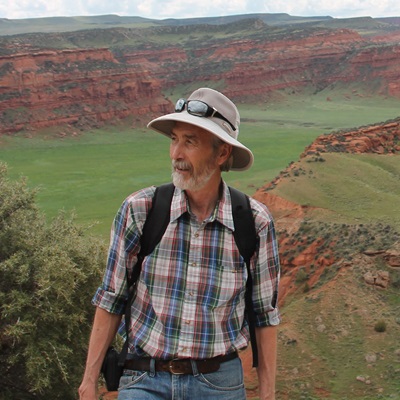
Registration Closed!
My First 50 Years in Archaeology and What I’ve Learned From a Life in Ruins with Robert L. Kelly
When: January 18, 2024 2:30-3:30 PM ET
Duration: 1 hour
Certification: None
Pricing
Individual Registration: Free to SAA members; not available to non-members
Group Registration:
Robert L. Kelly, PhD, University of Wyoming
Robert L. Kelly is an international authority on the archaeology and ethnology of hunting and gathering societies. He has participated in research projects in western North America since 1973. He has been president of the SAA (2001-2003), editor (2015-2018) of American Antiquity, a department head for 9 years and director of the Frison Insitute. He has lectured in many countries and has received $2+ million in grant funding and has authored 100+ articles, reviews, and books, including the widely-used textbook, Archaeology, in its 7th edition, co-authored with David Hurst Thomas; The Lifeways of Hunter-Gatherers (Cambridge University Press, 2013); The Foraging Spectrum (Smithsonian, 1995) and The Fifth Beginning (2016; Archaeological Institute of America Felicia Holton book award; translated to Chinese, Korean, German). He holds a Senior Humboldt Research Award (Germany) and is a fellow of two University of Cambridge colleges. A recent study places him among the top 2% of cited scientists in the world. Years ago, he lobbied SAA leadership to create the Native American Scholarship, and with Joe Watkins created the Native American Relations Committee; he is a strong advocate for tribal involvement in archaeology. He currently researches the use of radiocarbon dates as measures of prehistoric population, the long-term effects of demography and climate in NW Wyoming, ice patch archaeology in the Rocky Mountains, and with colleagues a Clovis mammoth kill site in Wyoming. His most recent publication (with Madeline Mackie and Andrew Kandel), in J. Arch. Sci. (2023), is “Rapid increase in production of symbolic artifacts after 45,000 years ago is not a consequence of taphonomic bias”).
My career began in 1973, at the age of 16, when I participated in the excavation of Gatecliff Shelter in central Nevada. Fifty years later, I’ve retired (but no plans to quit archaeology). I have lived through debates over the new archaeology (1960s/70s), processual vs. post-processual archaeology (1980s/90s), and NAGPRA (late 1980s, and apparently continuing). Archaeology today faces yet another challenge – I don’t know what to call it yet – and might become a very different field than it has been. I’ve spent my career in academia, but I’ve stayed in touch with the reality of careers in CRM, museums, and the government. My primary fieldwork has been in the western United States, mostly pre-contact foraging societies, but I’ve also done ethnographic work in Madagascar, and recently dabbled in Old World paleolithic archaeology. Writing textbooks has forced me to think about the field, where it is headed, and what students need to know; and The Fifth Beginning forced me to think about the bigger meaning of world history. So, put simply, I’d like to use my career, my “life in ruins,” to help students ask themselves: what kind of archaeologist do I want to be?
![How Dogs Can Be Useful: When and Why to Use Canines in Your Fieldwork [Foundational Skills]](/images/default-source/default-library/rpa-(2).tmb-seminar.png?Culture=en&sfvrsn=bf6380d9_1)
Registration Closed!
How Dogs Can Be Useful: When and Why to Use Canines in Your Fieldwork [Foundational Skills]
When: December 05, 2023 3:00-4:00 PM ET
Duration: 1 hour
Certification: RPA-Certified
Pricing
Individual Registration: Free to SAA members; $69 for non-members
Group Registration: Free to SAA members; $89 for non-members
Working a cold case investigation as a human remains detection canine handler I didn't know that my life was going to be changed forever. From that case I was introduced to archaeology and the greater world of anthropology, and that it would be the archaeologists looking at me, a dumb canine handler for answers that I didn't have. This put me on the pursuit of knowledge with questions being answered by anthropologists, archaeologists, research chemists, and more. At the same time, I was learning and being mentored by archaeologists and anthropologist while exploring the feasibility of utilizing dogs as a survey tool for historic and precontact remains. This pursuit of knowledge, my own questions, and work pushed me to return to school where I was able to also begin partnering the work of the dogs with shallow surface geophysical surveys. From there I have been able to work on a variety of projects across the world that have partnered both dogs and geophysics as part of the survey process to help direct excavations to either
enhance or prevent excavation of human remains.
Participants will be introduced to the growing survey method of archaeological or historical human remains detection dogs (AHRDD) and what makes them different when compared to the volunteer search and rescue human remains detection dog (SAR-HRDD) team. When to utilize canine resources during a project, what factors may impact their efficacy, and how to quantify/qualify the results.
- Participants will learn more about suitable canine teams for archaeological surveys.
- Participants will learn when or when not to include canines in a survey.
- Participants will learn how to quantify/qualify the results of the canine survey.


